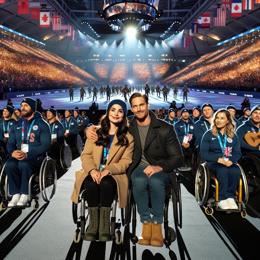Image created by AI
Gender Debate Ignites at Paris Olympics Over Boxer's Swift Victory
The Paris Olympics became the center of a heated gender debate after Algerian boxer Imane Khelif's rapid win in a 46-second bout against Italian opponent Angela Carini. Khelif's victory, leading her to the quarter-finals of the women's 66kg category, stirred a global controversy over gender eligibility rules.
As Khelif savored her victory, Carini was visibly shaken, showing clear signs of an injury. The Italian boxer’s distress highlighted not only the physical toll of the sport but also sparked a furious debate, evoking strong reactions from high-profile personalities and groups across the globe.
Amid the clash of both physical and ideological forces, various influential voices made their opinions known. The renowned author J.K. Rowling, known for her traditional views on gender, took to social media to criticize the Olympics, claiming that the Games had been degraded by the inclusion of an individual she perceived as biologically male. Rowling’s comments align with her broader stance against the participation of transgender athletes in women's sports, a stand which has previously attracted both support and criticism.
This view was echoed by Italian Prime Minister Giorgia Meloni, who indicated that the bout was "not on equal footing" and disapproved of the IOC's policy on gender eligibility. Tennis legend Martina Navratilova and UN special rapporteur Reem Alsalem also joined the chorus lamenting the situation, calling for a review of the policies governing athletes' participation in events based on gender.
It's important to note that Khelif and Lin Yu-ting's eligibility had previously been under scrutiny. They were disqualified from the 2023 world championships in New Delhi due to non-compliance with participation criteria for women's competitions. However, specifics regarding the tests that led to their disqualification remain confidential. Despite this setback, both boxers, who had competed in the Tokyo Olympics, have been cleared to compete at the Paris Olympics under IOC guidance.
The International Olympic Committee, currently in charge of boxing events because of various concerns surrounding the International Boxing Association, has assured that all participants conform to the eligibility regulations. According to the IOC, the athletes’ passports indicate their female gender, which is the basis for their participation in women's categories.
While the debate intensifies, Khelif has reserved her focus on securing a medal at the Olympics, taking her victory in stride. On the other hand, Carini's emotional reaction underscores the personal and professional impact of the controversy on individual athletes.
Defending their respective athletes, Algeria and Taiwan have strongly repudiated the criticism, with the Taiwanese President and Algerian Olympic Committee voicing their support. The Algerian boxer's triumph was cheered on by the large Algerian diaspora present in Paris, reflecting the complexity of national pride, sportive success, and the pressing global dialogue on gender identity and equality in sports.
As this debate unfolds, it reflects not only on the Paris Olympics but also on the future of gender classification in competitive sports, asking essential questions about fairness, inclusivity, and the ever-evolving understanding of gender identity.










